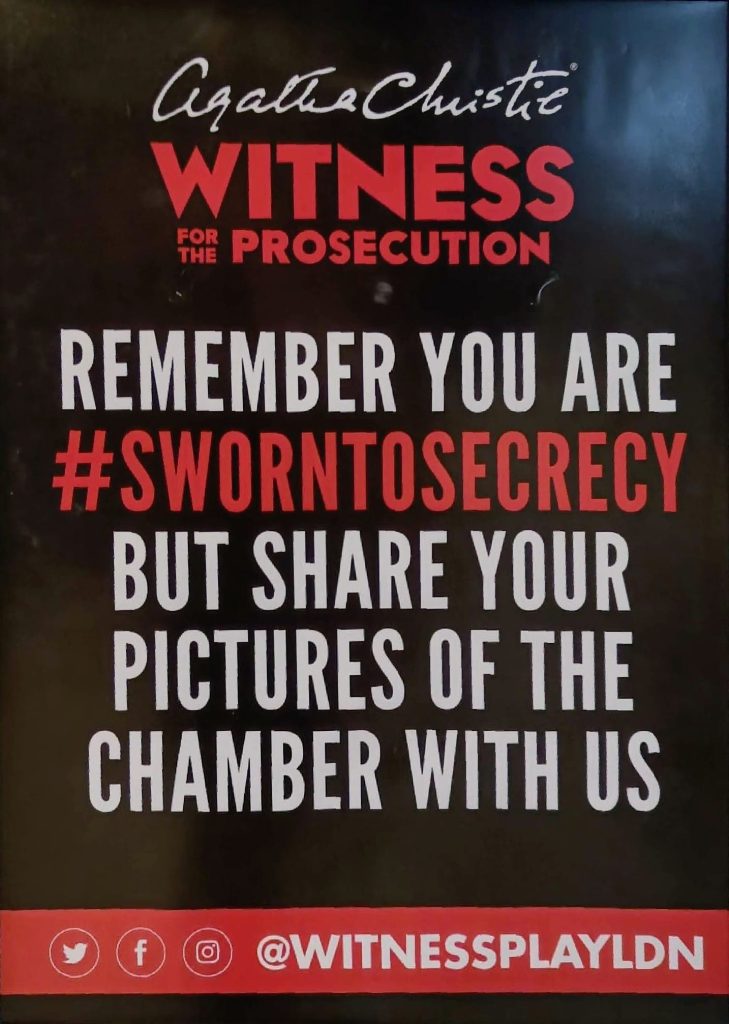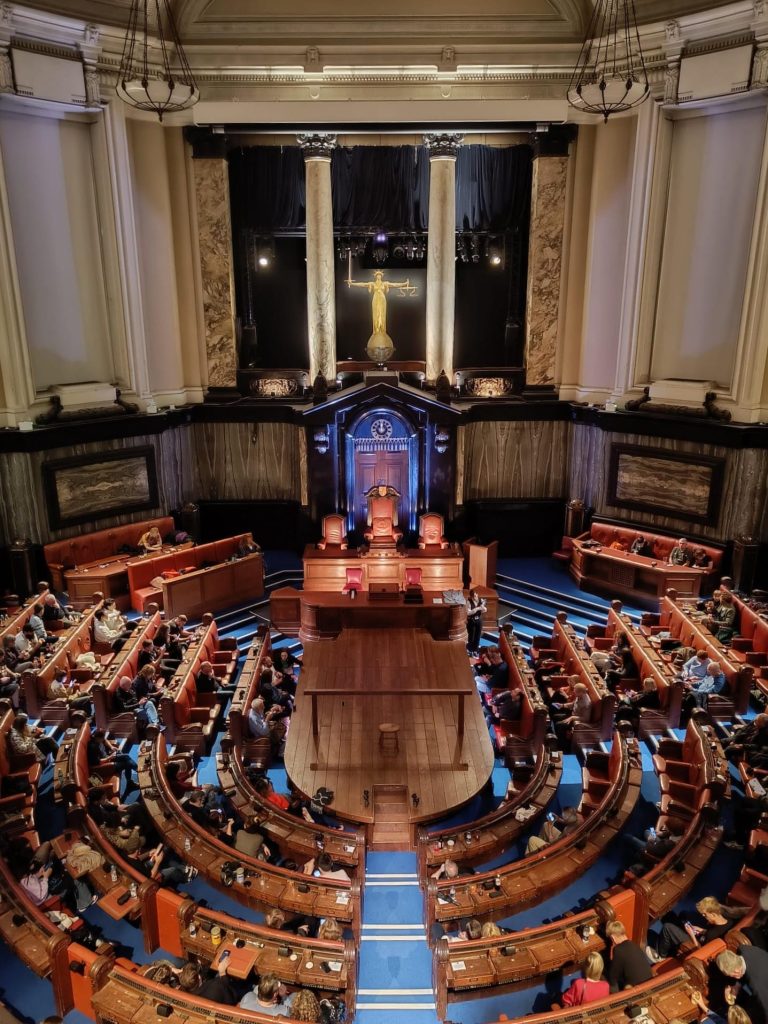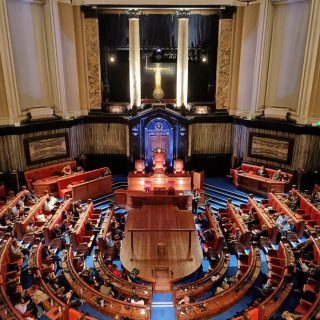We’re planning a series of law-related culture posts over the coming months – trying to entice you to get out and about, and enjoying law in a different way. First-up we have Lawbore Journalist (and GDL student) Chiara Shea sharing her experiences at County Hall recently – watching the stage-play of Agatha Christie’s fantastic Witness for the Prosecution.

The problem with being two months into a law conversion course is that you’ve managed to pick up JUST enough to realise how much there is still left to learn. More importantly, however, you now know JUST enough to become insufferable to everyone around you. Over the course of the last eight weeks, I’ve found myself perking up during everyday conversations, like a dog who has just heard someone opening a bag of crisps. My friends are thinking about buying a flat? How about a fairly dubious account of the differences between a freehold and a leasehold? Watching the football when you see someone taken out by a brutal tackle? How about a description of the Offences Against the Person Act which is, at best, only about 65% accurate? Family law remains safe from my interferences (we don’t cover that on the GDL). Don’t get me started on Tort, though. If I tell one more person that they might be able to sue over something, but no, I’m not entirely sure why, I’m pretty sure we’re going to have a criminal case on our hands.
Law, it turns out, is everywhere. It’s in everything and, faced with how little I know in the face of so much, I’ve been blundering around like a particularly earnest bull in the proverbial China shop as I scrabble to try and keep up. No one is more aware of this than my long-suffering partner, Chris, who has received a front row seat to the show which is “Chiara tries to learn the law”. So, when I told him that I’d grabbed us a pair of theatre tickets so that we could have a lovely evening together (one which wouldn’t involve me hunched over Glanville William’s Learning the Law with a confused look on my face) he was understandably delighted…and suspicious. Alright, mainly suspicious. Especially when I told him not to worry about what we were going to see, because it would be “a surprise”. The surprise in question was short-lived, and Chris’ dreams of a law-free evening went out the window as we turned off the Southbank and came face to face with signs advertising Agatha Christie’s Witness for the Prosecution. An eyebrow twitched but, other than that, he didn’t react. I felt rather proud of him.

Now in its sixth year of performance, Christie’s stage-play is hosted in The Chamber of London’s County Hall, which served as the headquarters of London’s local government until the abolition of The Greater London Council in 1986. Appropriately for the legal theatrics of a court room drama, the production seems happy to play on the idea that law may be second in spectacle only to theatre itself. Attendees are encouraged to share their photos from the evening with the tagline #SeeYouInCourt, whilst a prominent merchandise stand sells tote bags emblazoned with the words “GUILTY” or “NOT GUILTY” on either side. Sadly, however, there is not a novelty judge’s wig within sight. The real star of the show, though, is the old County Hall Council Chamber where the show takes place. With its mile-high ceilings, stately columns and aura of deep gravitas, the octagonal hall used to provide seating for more than 200 council members. Now those seats, along with the four public galleries which overlook the central chamber, are filled with theatre goers, eager for a night of criminal intrigue. I make Chris sit in the seat directly behind the giant pillar which doesn’t have a clear view of the witness box (after all, I have a REVIEW to write) and we settle in to watch.
Adapted from Agatha’s Christie’s short story ”Traitor’s Hands” (1925), the play follows the trial of Leonard Vole, a young man arrested for the murder of a wealthy spinster who had only recently revised her will to make him her sole heir. Vole maintains that his devoted wife, Romaine will be able to prove his innocence, providing him with an alibi for the time of the crime. However, both he and his legal counsel are shocked when Romaine appears in court not to speak in her husband’s defense but as, drum roll please, a WITNESS FOR THE PROSECUTION.
To divulge further details risks ruining the mystery which has made Christie’s tales such a perennial favourite with readers and theatre goers alike, though I will say that I can’t help but prefer the more subtle conclusion of her original short story to the topsy-turvy final twist she added for the stage adaptation. Still, if this was a normal review, of the kind someone with my arts background is more used to writing, this would be the point where I would call attention to the specific qualities of the show itself. I might comment on how effectively the production uses the asset of the actual Council Chamber, making the most of the limited stage space to produce a modified “in the round” arrangement and making the audience feel at the heart of the action. Twelve audience members, seated to the right of the Judge’s bench, are even addressed as the jury, and are actually asked to deliver final judgement concerning Vole’s guilt at the trial’s climax. I could mention how well the cast balance the theatricality required by Christie’s script with a more subtle performance. They give those watching all the desired bang for their buck in terms of melodrama without ever descending into farce. After all, as the production’s director, Lucy Bailey, remarks of Christie’s plays…
“…you have to commit to them, honour them and take them deadly seriously and then they repay you”.
Alternatively, I could also tell you about how exasperated Chris got whenever I leaned over to nudge him during the performance, usually to whisper about something I’ve learned over the last two months which was, admittedly, only tangentially related to the proceedings on-stage (“This reminds me of mooting!” “Oh my god…”). All of that, as it turns out, would be true and, until my tendency to talk during theatre productions becomes a (justifiably) prosecutable offence, I shall remain at large. However, that’s not what this is about. No, what “this” is, ultimately, is an account of what it feels like to watch a Christie courtroom drama with just over six weeks of law school under your belt, thinly disguised as a theatre review.
One of Christie’s earliest written drafts of Witness for the Prosecution apparently included the note “legal fun to be added!” scrawled in the margins, and it’s this concept of “legal fun” I feel best encapsulates the experience of witnessing the play for myself (pun most definitely intended). The truth is, as anyone who decides to pursue a legal career is reminded at every turn, 99% of law is about as dramatic as a slice of unbuttered toast. The vast majority of trials, we are repeatedly told, are boring, and even those looking to work at the criminal bar should expect a lot more paperwork and procedure and a lot less drama on the courtroom floor than the popular imagination would have us believe. Yet, in adapting Witness for the Prosecution for the theatre, Christie sought to bring the courtroom centre stage, both literally and figuratively. She understood the fascination which trials hold for the public. Most importantly, she understood the appeal which a bit of “legal fun” holds for all of us.

Chiara Shea is a current GDL student and aspiring barrister at City Law School, hoping to practice in the areas of intellectual property and media law. Before deciding to pursue a legal career, she worked as a writer, researcher and academic in the fields of literature and the arts. She is a graduate of Balliol College, Oxford, and holds a doctorate in modern American poetry and spatial theory from King’s College London. She lives in North London with her two (very spoiled) cocker spaniels, Waffles and Bowser, and will subject anyone to photos of them if they so much as loiter near her for too long.

